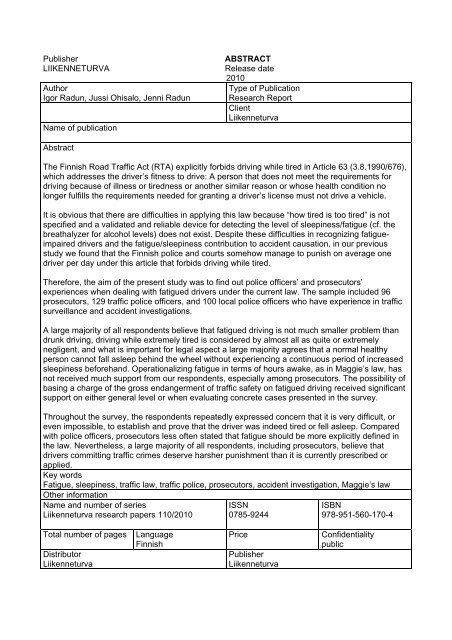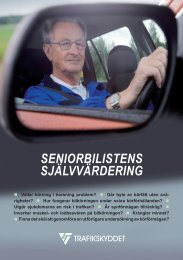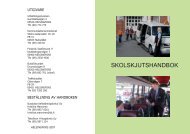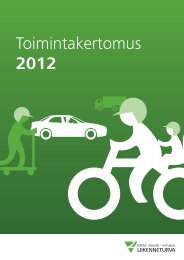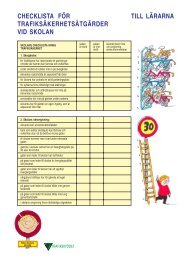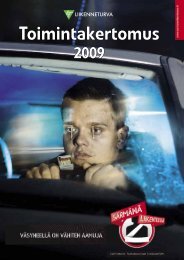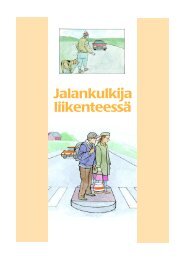Väsymys tieliikenteessä ja laki. Lainsoveltajan ... - Liikenneturva
Väsymys tieliikenteessä ja laki. Lainsoveltajan ... - Liikenneturva
Väsymys tieliikenteessä ja laki. Lainsoveltajan ... - Liikenneturva
Create successful ePaper yourself
Turn your PDF publications into a flip-book with our unique Google optimized e-Paper software.
Publisher ABSTRACT<br />
LIIKENNETURVA Release date<br />
Author<br />
Igor Radun, Jussi Ohisalo, Jenni Radun<br />
Name of publication<br />
Abstract<br />
2010<br />
Type of Publication<br />
Research Report<br />
Client<br />
<strong>Liikenneturva</strong><br />
The Finnish Road Traffic Act (RTA) explicitly forbids driving while tired in Article 63 (3.8.1990/676),<br />
which addresses the driver’s fitness to drive: A person that does not meet the requirements for<br />
driving because of illness or tiredness or another similar reason or whose health condition no<br />
longer fulfills the requirements needed for granting a driver’s license must not drive a vehicle.<br />
It is obvious that there are difficulties in applying this law because “how tired is too tired” is not<br />
specified and a validated and reliable device for detecting the level of sleepiness/fatigue (cf. the<br />
breathalyzer for alcohol levels) does not exist. Despite these difficulties in recognizing fatigueimpaired<br />
drivers and the fatigue/sleepiness contribution to accident causation, in our previous<br />
study we found that the Finnish police and courts somehow manage to punish on average one<br />
driver per day under this article that forbids driving while tired.<br />
Therefore, the aim of the present study was to find out police officers’ and prosecutors’<br />
experiences when dealing with fatigued drivers under the current law. The sample included 96<br />
prosecutors, 129 traffic police officers, and 100 local police officers who have experience in traffic<br />
surveillance and accident investigations.<br />
A large majority of all respondents believe that fatigued driving is not much smaller problem than<br />
drunk driving, driving while extremely tired is considered by almost all as quite or extremely<br />
negligent, and what is important for legal aspect a large majority agrees that a normal healthy<br />
person cannot fall asleep behind the wheel without experiencing a continuous period of increased<br />
sleepiness beforehand. Operationalizing fatigue in terms of hours awake, as in Maggie’s law, has<br />
not received much support from our respondents, especially among prosecutors. The possibility of<br />
basing a charge of the gross endangerment of traffic safety on fatigued driving received significant<br />
support on either general level or when evaluating concrete cases presented in the survey.<br />
Throughout the survey, the respondents repeatedly expressed concern that it is very difficult, or<br />
even impossible, to establish and prove that the driver was indeed tired or fell asleep. Compared<br />
with police officers, prosecutors less often stated that fatigue should be more explicitly defined in<br />
the law. Nevertheless, a large majority of all respondents, including prosecutors, believe that<br />
drivers committing traffic crimes deserve harsher punishment than it is currently prescribed or<br />
applied.<br />
Key words<br />
Fatigue, sleepiness, traffic law, traffic police, prosecutors, accident investigation, Maggie’s law<br />
Other information<br />
Name and number of series<br />
<strong>Liikenneturva</strong> research papers 110/2010<br />
Total number of pages<br />
Distributor<br />
<strong>Liikenneturva</strong><br />
Language<br />
Finnish<br />
ISSN<br />
0785-9244<br />
ISBN<br />
978-951-560-170-4<br />
Price Confidentiality<br />
public<br />
Publisher<br />
<strong>Liikenneturva</strong>


